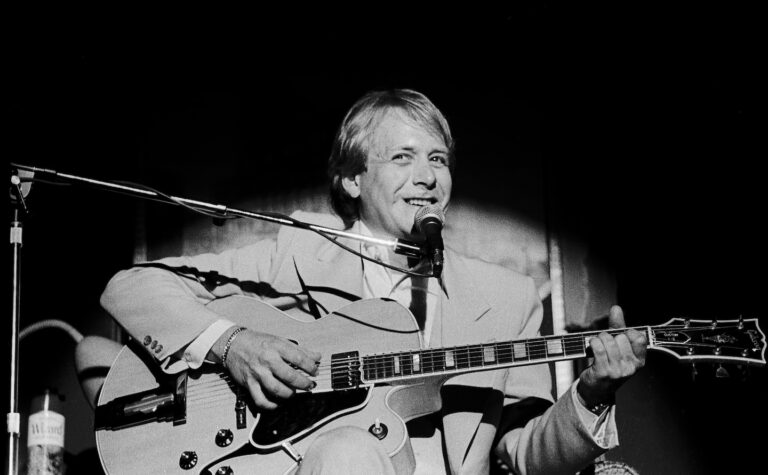We throw across the time period “Renaissance man” prefer it’s a Nerf soccer at a Memorial Day picnic, but it’s onerous to explain the actor and comic Martin Mull, who died Thursday at 80, in another method.
On digicam, how he’s greatest recognized, Mull was immediately recognizable. His sarcastic and smug half-chuckle informed you he knew his character’s superiority advanced was ridiculous and, given the fact he poked enjoyable at, not-so-sweetly subversive. He might be lovable on-screen — like when he and Fred Willard received married on “Roseanne” throughout the sitcom’s wonderful Nineties run — however I most appreciated the chunk as he performed with and poked on the norms of leisure tradition.
Within the Nineteen Seventies and ’80s, at a time when comedy was dominated by White males with only a few exceptions (Richard Pryor, Eddie Murphy), Mull mocked Marvel Bread middle-of-the-road America as a lot as any social critic, but you didn’t understand it till you observed you had been laughing at your personal neighborhood.
Watch that mustachioed wink as he comes upon a stack of untamed geese drink coasters on a espresso desk whereas touring a suburban residence because the sweater-vested host of the mockumentary “The History of White People in America” and acts as if he’s discovered the Lifeless Sea Scrolls. These coasters, he says as he holds one up as a visible help, are “right here to guard any pure woods. Ought to they happen.”
Later, Mull stole scenes on “Veep” and “Arrested Improvement.” However for me, his greatest appearing got here as smarmy TV host Barth Gimble on “Fernwood 2 Evening,” a satirical late-night speak present created by Norman Lear that aired in the summertime of 1977. Gimble, rising throughout the Johnny Carson period, served as a precursor to each Garry Shandling’s Larry Sanders and Zach Galifianakis’s “Two Ferns” persona. And once more, he had Willard, additionally sadly gone, as his foil in crime.
I might write one other appreciation about Mull’s painting, his time on the Rhode Island College of Design and the way, because the years handed, Mull settled right into a profession that discovered his hyperrealist works proven in galleries and museums and even featured on guide and album covers.
However as we mourn Mull, I need to give attention to his music. As a result of throughout the Nineteen Seventies, Mull managed to prove a number of the greatest music parodies pressed in wax. No half-stepping right here. He might play his Gibson archtop guitar nicely sufficient to trade licks with Glen Campbell, although he wasn’t afraid to choose up a tuba — or sousaphone — if that’s what the efficiency referred to as for. Throughout his musical profession, Mull even opened for Bruce Springsteen, Frank Zappa and Billy Joel.
These information and performances served as a bridge between the MIT prof-turned-parodist Tom Lehrer and the MTV-era emergence of “Bizarre Al” Yankovic.
What Mull understood is that to poke enjoyable at a type, you needed to decide to the shape. So on “Do the Nothing,” he will get the viewers clapping as he’s ostensibly launching into what guarantees to be a catchy music a couple of fashionable new dance transfer besides that the dance is, because the title hints at, completely nothing. He even stops enjoying on the refrain to show his level, and but the clapping continues, awkwardly, as a result of a crowd informed to clap by a star performer goes as to whether there’s one thing clap-able occurring or not. Mull begins to unfold out reward to particular person members of the band although we hear they’re not enjoying a be aware.
On one other music, “Jesus Christ Soccer Star,” he dips into gospel as Devil delivers an onside kick and Matthew, “thinkin’ fast,” recovers to make it Christians, first and 10: “Let’s give Jesus Christ the soccer/ let him even up the rating/let him run it by means of the crossbars/ and be on the cross no extra.”
After I get the prospect to play one Mull music to an unsuspecting pal or member of the family, it’s at all times “Ukulele Blues,” recorded in 1973. Right here, he manages to completely mock the custom of White cultural appropriation at a time when numerous Black blues artists had been watching Eric Clapton, Led Zeppelin and even Ram Jam money in on unique songs. Which makes “Ukulele Blues” sound nearly dutiful, a sort of smarty-pants lecture. It’s something however.
The blues, as Mull reminds us in a prolonged introduction, is about getting again to your roots. On this case, he says with out breaking character, he’s fascinated about his grandfather, who was an actual property man doing “very very nicely,” residing within the coronary heart of the delta. Cleveland’s Lake Erie delta.
“Plenty of chances are you’ll really feel you need to be poor to play the blues,” he says, with a dismissive chuckle. “Don’t make me chortle.”
Then Mull, who usually carried out carrying a yellow tux and bow tie, begins choosing on the open-tuned ukulele in his lap. Mississippi Fred McDowell sawed down the neck of a Gordon’s gin bottle for his slide. Mull? He makes use of a child bottle — and nonetheless pulls off a reputable accompaniment to his story of suburban woe.
I awakened this afternoon, HOOOOO/ I noticed each vehicles had been gone
I awakened this afternoon, lord mommy/ I noticed each vehicles had been gone
I felt so low down deep inside/ I threw my drink throughout the garden
By the top of the ’70s, Mull would cease recording his music, however he wouldn’t abandon the instruments that made these information so particular: data, technical talent and dedication to the position. These would assist him on-screen as he continued to crack at cultural norms, a real unique who can by no means get replaced.

